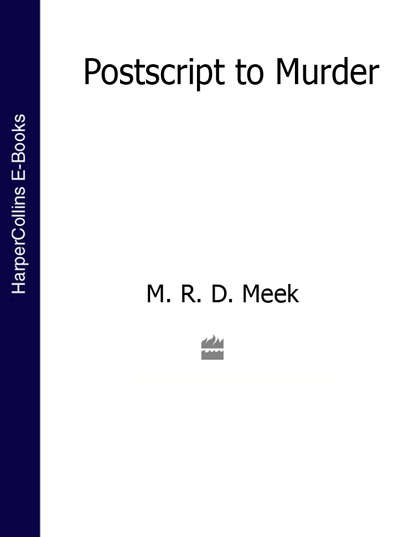По всем вопросам обращайтесь на: info@litportal.ru
(©) 2003-2025.
✖
Postscript to Murder
Автор
Год написания книги
2018
Настройки чтения
Размер шрифта
Высота строк
Поля
Daniel Frobisher was not what Kemp expected; he thought of reporters as eager young men in leather jackets. Frobisher was in his fifties and soberly dressed in a grey suit. He was a stocky man of good features. Glasses did not quite conceal a cast in his left eye which gave him a slightly sinister look until one became reconciled to it.
‘Mr Kemp? Of course, I’ve seen you in court. Mrs Kemp, we haven’t met?’ His glance swept briefly over her. ‘Sorry to intrude on your Saturday leisure.’
He was already in the hall. ‘Nice house, this. Glad to see you’ve not altered it. A good period for architecture.’
‘Do come in, Mr Frobisher,’ Kemp told him, rather belatedly. ‘We can talk in the study.’
He led the way into the small room designated as such, though so far unused since the habits of a single man had been already cast off by Kemp, without regret.
Mary hovered for a moment in the doorway.
‘I have to shop, Lennox, or there’ll be no meals in this house today. Nice meeting you, Mr Frobisher.’
‘She’s an American, your wife?’ asked Frobisher as soon as he heard the front door close.
‘Is she?’ said Kemp, pleasantly. ‘I hadn’t noticed … Now, Mr Grimshaw said you had a packet of letters for me.’
‘Sure. Sure. Here it is.’ Frobisher struggled with an inner pocket and produced a brown paper package. Kemp took it from him. It was unmarked, unaddressed and had been originally sealed with Sellotape. He shook out the contents which he recognized instantly: three envelopes postmarked and bearing his address. He was aware of the reporter’s eyes upon him as he carefully scrutinized the letters.
‘All present and correct, squire?’ It was a sobriquet which Kemp particularly deprecated, but here the style bespoke the man: Frobisher was the sort who would see himself as equal in any company.
‘I think so. Will you thank your editor for me? I understand from him you will keep your discretion.’
As if on cue, Dan Frobisher laid a surprisingly well-manicured finger along the side of his nose. ‘Mum’s the word. You can count on me. Is that all, Mr Kemp?’
‘All for now, Mr Frobisher. What else did you have in mind?’
‘I’m a reporter, squire … Just doing my job, like you do yours …’
‘Look, there’s nothing further in this for you – at least for the present.’
Frobisher walked round the big desk, looked down at its bare surface, then transferred his gaze to the bookshelves where Kemp had begun to arrange his literary treasures. ‘H’m … the classics … I’m a great reader myself, Mr Kemp … “A Good Book is the Precious Life-blood of a Master Spirit” … I remember that from my schooldays … You’ve a nice set of Disraeli there … Who do you think wrote them?’
Kemp stopped himself saying, ‘Disraeli, of course.’ He knew exactly what Frobisher was up to – the man must have been studying the techniques of television interviewers.
‘I’ve no idea,’ he said, smoothly.
‘Oh, come on, surely you haven’t got that many disgruntled clients.’
Frobisher turned from his contemplation of the Victorian brown-and-gold bindings, and grinned at Kemp.
There was no doubt here was a man on the make. He had scented a good story, perhaps one of the few to come within the orbit of a small provincial paper, and he had decided to milk it for all it was worth. Kemp was wary of journalists, but they were a breed he had no wish to antagonize.
‘Shall we just say the question is an open one? Your editor has suggested the services of the Gazette might be used … These services at the moment require you to keep your mouth shut, Mr Frobisher. When the writer of these letters is discovered Inspector Upshire will issue a statement. In the meantime I have no comment to make.’
‘Now there’s a phrase sticks like wax in the ears … Mine, I keep ’em open, Mr Kemp. That little item this morning, you may not like it but it’ll get people talking … Stir things up a bit. Might make it easier for the police to get their man …’ He had turned to the bookshelves again, peering at the titles. ‘Lord Lytton, eh? That’s turgid stuff … D’you suppose anybody reads him now?’
‘Not as many as read the Newtown Gazette. Did it never occur to you that the reason those letters were delivered to your paper was simply that, to stir things up? The publication of that little item, as you call it, has helped neither myself nor the police to find the culprit.’
Kemp disliked talking to any man’s back so he opened the study door and walked into the hall, leaving Frobisher no alternative but to follow. Eventually he did so, but with reluctance.
‘I like your taste in houses, Mr Kemp, like your choice of books, old-fashioned but very correct. A good image for a solicitor … Can’t afford a blot on the escutcheon. Leatown, wasn’t it?’
If it was meant as a disabling shot it misfired – Kemp was ready for it.
‘A good reporter does his homework, Mr Frobisher, and I can see you’ve done yours. But that story’s been dead for twenty years, and if you’re thinking of bringing it back to life I would remind you of the little matter of difference between libel as a tort and libel as a criminal offence. You’re a well-read man, Mr Frobisher, so I shall detain you no further on the subject – nor on any other.’
‘No offence meant, squire – and none taken, I hope. Homework always was a bind but it had to be done. From what I gathered, you had a rough time of it back then … And you’ve helped put away a few villains since you came to Newtown. Don’t think I don’t appreciate that.’ There was even a hint of admiration in Frobisher’s voice as he flipped out a card. ‘Call me any time.’
‘Thanks.’
Slightly mollified, Kemp took the card as he opened the front door.
‘That’s a fine new bit of timber you’ve got there, but it’s not a patch on the old one,’ Frobisher remarked as he went down the step. ‘Some say we need neighbourhood-watch schemes … Newtown’s always had ’em, neighbours watching robberies like it was television only not so exciting …’
Though cynical, the observation was apt. Kemp had also found the people of Newtown anxious to keep themselves to themselves, like the three monkeys, when it came to cooperation with the forces of law and order, an attitude which did little to diminish the crime figures.
He thought of this, and of other things, as he closed the door and went back to his study to ponder on the interview. Was Daniel Frobisher as smart as he made out, or had he merely picked up a few tricks of investigative journalism with which to dazzle the natives? At his age he should have wider scope than his present job on a local weekly mostly given over to weddings and obituaries, and only occasionally enlivened by reported rows in the council chamber.
‘He was thorough,’ Kemp told Mary over lunch. ‘I’ll say that in his favour.’
‘Thoroughly bad.’ Mary held to a definite opinion. ‘I didn’t like him one bit.’
‘You hardly saw him.’
‘I saw enough. He gave me a passing glance and decided I wasn’t pretty enough to bother with …’
‘He didn’t get as far as your ankles. Anyway, you can’t blame him for simply overlooking you. I wouldn’t want someone like him taking an interest.’
‘Neither would I. It’s lucky for you, Lennox, that you married a plain woman. Those who are fair of face have significance for men, they start wondering where the husband got hold of her and what’s she like in bed.’
Kemp watched his wife as she peeled an apple. Everything Mary Madeleine did she did with the same quiet intentness, as if all that mattered was the here and now. She was the most concentrated person he had ever met. Yet she could let her mind fly, and her words, too, when the fancy caught her as it had just done.
‘Do you know who he’s married to?’ she said.
‘I never thought to ask.’
‘Amy Robsart.’
‘Not Leicester’s love? Shut up in Cumnor Hall so lone and drear?’
‘I don’t think so.’ Mary went on cutting up her apple. ‘I’ve no idea what you’re talking about. Amy’s the daughter of the Robsarts at the corner shop where we get our papers.’
Kemp had to shift gear to keep up with her.
‘Someone else has been doing their homework … How did you come by this gem?’
‘I was paying our account when Mrs Robsart did a tut-tut about that item in the Gazette. Terrible thing, Mr Kemp getting them poison-pen letters … So I said we’d a Mr Frobisher in the house right now helping us with our enquiries. Don’t they call that a euphemism?’






